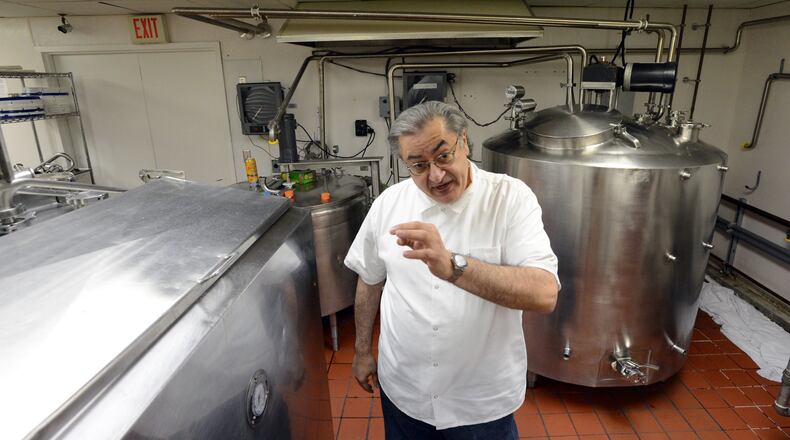“My heart is broken,” The Big Cheese told me.
Ron Marks, who used the titles president and "The Big Cheese" on his now-unnecessary business cards, launched a fancy Greek yogurt venture in Gwinnett County in 2009. The operation, AtlantaFresh, used milk from grass-fed cows and flaunted flavors like black cherry & port wine (all in one, 6-ounce container), fresh roast coffee and ginger peach.
Many entrepreneurs — probably too many, in fact — have foodie dreams, from cupcakes to smoked meats and gluten-free everything.
Marks’ AtlantaFresh became particularly successful largely thanks to Whole Foods, the national patron saint of natural foods and the little guy. The company loaned him money to grow and made big promises. Then, Marks said, the patron saint killed his business.
Enablers aren’t always a good thing. Don’t put all your eggs, yogurt, cupcakes, cured meats or other food dreams in a Whole Foods, Amazon, Walmart or other-big-company basket. It’s too easy to get turned over.
And if you’re a shopper who loves a small, local, non-GMO, artisanal-something-or-other food brand, cherish it while you can. Because the food industry can be a harsh place.
AtlantaFresh is essentially dead as an ongoing operation. Marks told me his Peachtree Corners operation has processed its last batch of milk. Most of his 32 employees are out. The 62-year-old former Applebee's senior executive and former industry consultant said he's attempting to avoid corporate and personal bankruptcy.
Recently, he sent Whole Foods an invoice for $15.2 million. He said it would make up for bottled milk Whole Foods contracted to buy from him but didn’t. He’s hoping it will at least get the company to the mediation table.
I spoke to several owners of other small Georgia-based food companies that have or had products on Whole Foods’ shelves. They expressed varying level of overwhelming praise and some concerns about interactions with the company.
"I don't think I would be in business today if it wasn't for Whole Foods," said Dick Byne, of Byne Blueberry Farms in Waynesboro, Ga.
The grocer loaned Byne money and was cooperative even when he had a bad year. Now, it’s responsible for 90 percent of his revenue, he said. “You gravitate to the business that is very positive and is willing to help you.”
Keith Schroeder, the CEO of High Road Ice Cream in Marietta, also has worked with Whole Foods and was happy to have landed a sizable contract with the grocer, which peaked at providing about 35 percent of his sales.
“It was so seductive,” he said. Then Whole Foods yanked the project early.
Schroeder, who told me he has an MBA and a background as a chef, said many food startups have good ideas for tastes but don’t have enough business expertise.
Schroeder told me he’s a friend of Ron Marks from AtlantaFresh, which he said “came to market with an amazing yogurt.”
But he thinks Marks made a crucial miscalculation. “He believed Whole Foods to be more benevolent than a publicly traded company is wired to be. A publicly traded company is wired to pursue profit.”
Whole Foods didn’t share much with me about the AtlantaFresh situation. A spokesperson emailed a statement that the grocer works “closely with each of our suppliers to try to create successful relationships.”
When local products don’t meet sales expectations “we have ongoing conversations with the supplier to try to improve sales. In this case, we also made significant efforts across the business to increase sales, including in-store marketing, paid advertising, special promotions and expanded distribution. Despite our efforts, we are not always able to raise demand and we must occasionally make the difficult decision to discontinue products.”
Marks’ take is notably different.
Within three months of launching his Greek yogurt business, he landed his products in Whole Foods stores. By 2015, Whole Foods was responsible for 60 percent of AtlantaFresh’s sales.
But by then, Marks said, Whole Foods executives approached him with an idea: bottle grass-fed, non-GMO milk.
“I’m a yogurt maker not a milk bottler,” Marks remembered saying to himself at the time. But he came to believe the offer would launch him in a smart strategic direction for high-end milk.
Whole Foods gave him a $500,000 loan and Marks borrowed $2 million more from others to finish building out his processing space. The grocer also agreed to a seven-year contract to buy at least 30,000 gallons of milk a week and to market his product, according to Marks.
The Big Cheese told me he thought his company’s $3 million in annual sales would jump to $20 million or more.
It didn’t happen.
“Their forecasts and execution were so far off,” Marks said.
He contends Whole Foods never took delivery of more than a third of what it contracted for; it did virtually no marketing for his products and the grocer’s distributor didn’t get milk on shelves fast enough, which meant consumers faced milk that was just a few days from expiring.
Fourteen months into the seven-year contract, a senior executive at Whole Foods called to say the deal was off.
That was about two months after Amazon had announced it was buying Whole Foods, which had been facing financial struggles.
Marks told me if Amazon had any impact on his situation it was just that it sped up actions Whole Foods was eventually going to take any way. Marks said ultimately he didn’t have enough time to replace enough of the Whole Foods business with new customers.
It wasn’t a dilemma he had prepared for.
“My guard was not up,” he said. “They had been our strongest supporter.”
Related coverage:
Find more Kempner columns here: http://www.myajc.com/news/opinion/matt-kempner-unofficial-business/j9F7R2mOGomS5FMjfhho2O/
Check Matt on Facebook (https://www.facebook.com/mattkempnercolumnist) and Twitter (@MattKempner) or email him at mkempner@ajc.com.
About the Author
Keep Reading
The Latest
Featured



